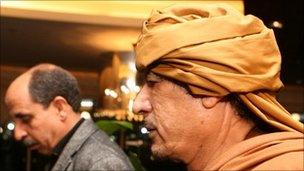Libya sanctions extended by European Union
- Published

Several countries have frozen assets of the Libyan leader Col Gaddafi and members of his family
The European Union has agreed to extend its economic sanctions against Libya to include the country's sovereign wealth fund and central bank.
Three other financial "entities" will also be targeted.
The Libyan Investment Authority (LIA) wealth fund holds about $70bn (£43bn) and has stakes in a number of large European companies.
The US has already frozen about $30bn of Libyan assets, including those of the LIA and central bank.
An EU spokesperson said: "The funds and economic resources of the five designated entities will be frozen and an additional name will be added to the list of 26 individuals deemed responsible for the violent crackdown on the civilian population since 15 February and subject to an asset freeze."
The extended sanctions will come into force on Friday.
Company holdings
The EU had already frozen assets of Libyan leader Muammar Gaddafi and some members of his family.
It had also banned the supply of arms, ammunition and any equipment that could be used for "internal repression".
It did not initially target the LIA as there was some debate about whether its assets belonged to the Gaddafi family or the Libyan people, analysts said.
The fund holds stakes in a number of companies, including the UK publishing group Pearson, Italy's Unicredit bank and industrial group Finmeccanica, as well as Canadian oil exploration group Verenex.
This fact could also have contributed to the delay in extending sanctions, analysts said.
Established in 2006, the LIA holds about $70bn of assets and is the 13th largest sovereign wealth fund in the world, according to the Sovereign Wealth Fund Institute.
The fund, built on Libya's oil wealth, scores two out of 10 on the institute's transparency ranking.